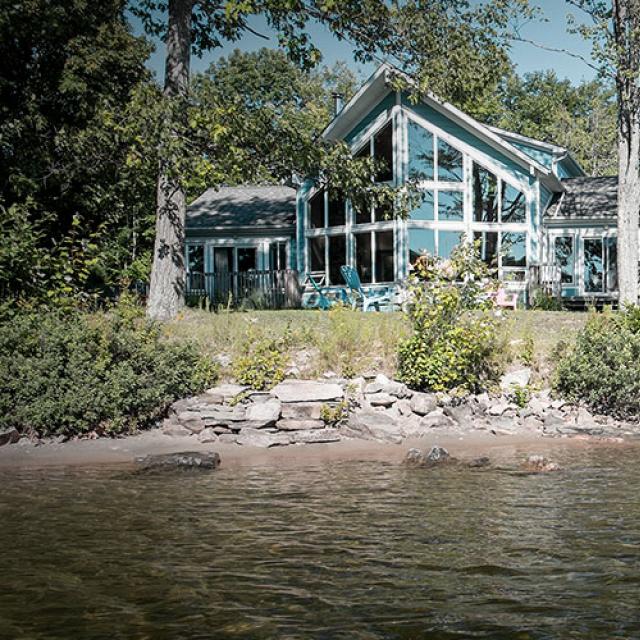Everything you need to know about insuring a secondary residence

Whether you own a log cabin on a lake, a ski cottage or a beach house, your secondary residence must be well protected in the event of a disaster. At Promutuel Insurance, we understand the importance of insuring your getaway home based on your situation and needs. Here’s how to choose the right insurance for your secondary residence for peace of mind—rain or shine.
Secondary residence. . . or seasonal residence?
Secondary residence
A secondary residence is a place you visit regularly throughout the year, whether for weekend getaways or monthly stays of several consecutive days. It is accessible at all times, regardless of the season.
If you own such a home, discuss it with your damage insurance representative. They will be able to properly advise you on possible coverage options to provide you with an insurance product that meets your needs.
Seasonal residence
A seasonal residence is used for only two or three seasons during the year. Whence the name, “three-season” cottage. Policies for seasonal residences usually cover “named perils”, such as fire, wind storms, lightning, and hail.
They generally do not cover theft, vandalism and certain types of water damage. Therefore, it is essential that you take some preventative measures before closing up for the season.
Choosing the right coverage
As an owner of a cottage or any other secondary or seasonal residence, it is important that you have coverage that is tailored to your situation and insurance needs. Here's an overview of the options that may be available to you.
Secondary residences (a second dwelling that is used regularly)
First, it’s important to note that since a secondary residence is considered a second home, it is generally protected by “homeowner” insurance. Apart from providing basic coverage, it allows you to choose additional coverages based on your specific needs and the specific characteristics of your property.
Property insurance
Property insurance covers your personal property, your home and any outbuildings from damage such as fire, theft, vandalism and some water damage, subject to the protections, conditions, limitations and exclusions in your policy. It also covers your personal property in your vehicle when you’re driving.
Third-party civil liability insurance
An accident happens so quickly and can have serious consequences. In the event that you are held liable for bodily injury or property damage caused unintentionally to another person, only third-party liability insurance will protect you against any resulting financial consequences, subject to the applicable conditions, limitations and exclusions. Imagine a fire that inadvertently starts and damages a neighbour’s home. In such a situation, you may be considered liable for damages, and your liability insurance will protect you in such a case, subject to the terms, limitations and exclusions of your policy. Think about it!
Other useful coverages
Depending on your situation, your damage insurance representative may advise you to include additional types of coverage for your secondary residence, such as:
- Water damage (above-ground, soil and sewer water)
- Earthquake damage (including fires, explosions and smoke damage that may result)
- Damage to your pool or spa
They may also recommend legal insurance, which provides financial assistance to help you find an amicable or legal solution to a covered dispute.
Seasonal residences (sporadic occupancy, a few times a year)
Seasonal residences that are occupied two or three seasons a year require less protection than secondary residences. Your damage insurance representative may suggest property insurance and third-party civil liability insurance as well as some optional types of coverage, depending on your situation. Feel free to ask them any questions you may have, they are THERE for you!
What if the dwelling is unoccupied for an extended period of time?
There are many reasons why a secondary or seasonal residence may remain unoccupied for a period of time, as in the case of a three-season cottage, for example. Here are some steps to take if you expect your secondary or seasonal residence to be uninhabited for an extended period of time.
Conduct regular seasonal maintenance to limit damage
- Cut the grass, trim trees and shovel snow. This will help maintain your home.
- Make sure the roof and eaves are in good condition to avoid possible damage from the weather.
- If possible, to properly prepare the cottage for the winter, cut off services such as water, electricity and gas and follow maintenance recommendations to minimize the risk of leaks or other incidents.
Protect your home from theft and vandalism
- Schedule regular visits by a nearby neighbour or family member. It helps to have someone around to keep your property safe and ensure some basic maintenance, if necessary.
- Be discreet—don’t mention that your home is or will be unoccupied.
- Lock your doors and windows.
- Install an alarm system and surveillance cameras.
Remember to read your insurer’s requirements when your secondary or seasonal residence is unoccupied for an extended period of time. For example, if your absence occurs during the winter, your insurer may recommend that someone regularly come to check that the heating is working or that you turn off the water and drain all the pipes and appliances.
Note that if your residence is considered to be vacant, different rules apply and your insurer must be notified promptly.
Did you know?
By insuring all your properties with Promutuel, you may be eligible for our multi-home discount. House, apartment, condo in town, cottage—the more properties you have, the more you save! Learn about our eligibility requirements!
To insure your cottage or any other secondary or seasonal residence, apply online today or contact one of our damage insurance representatives!



